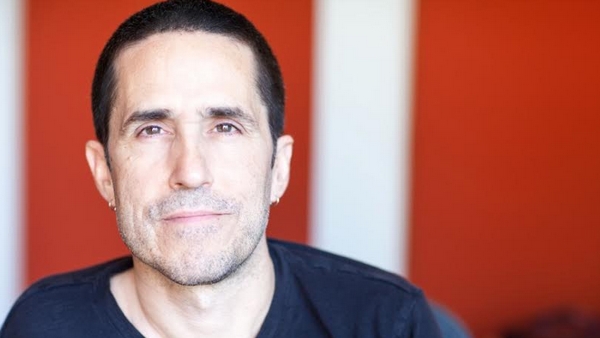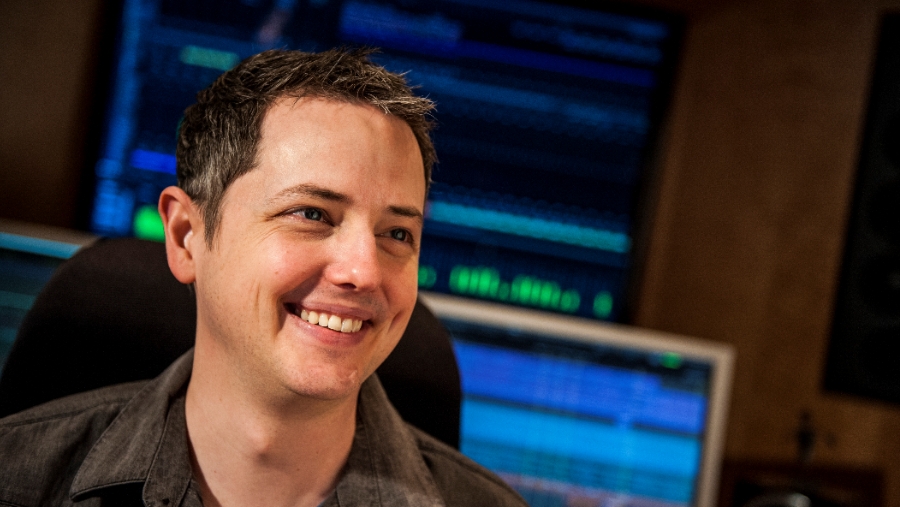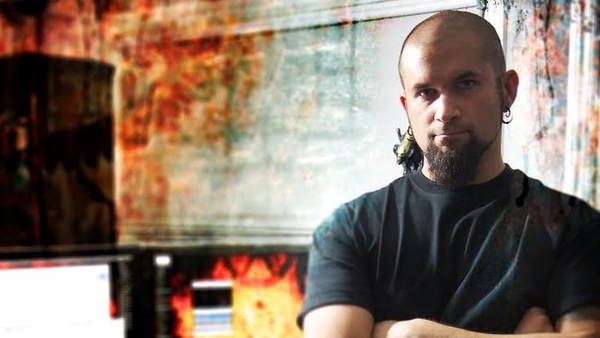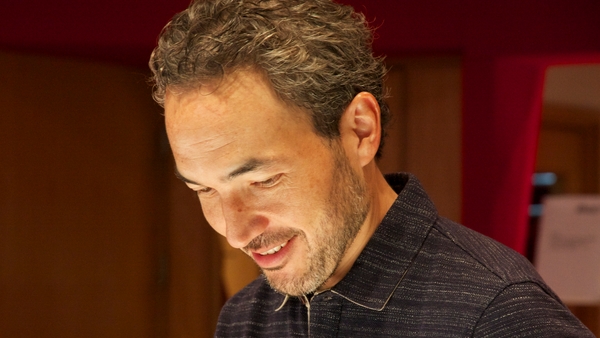 Grammy nominated musician Mac Quayle has written music for over 40 films and television shows, and has accumulated a long list of credits as a music producer, dance re-mixer and multi-instrumentalist. Mac recently received his first EMMY nomination for FX’s hit series, “American Horror Story: Freak Show,” starring Jessica Lange, Kathy Bates and Angela Bassett, and he will also be scoring the next season of “American Horror Story: Hotel,” starring Lady Gaga and Matt Bomer.
Grammy nominated musician Mac Quayle has written music for over 40 films and television shows, and has accumulated a long list of credits as a music producer, dance re-mixer and multi-instrumentalist. Mac recently received his first EMMY nomination for FX’s hit series, “American Horror Story: Freak Show,” starring Jessica Lange, Kathy Bates and Angela Bassett, and he will also be scoring the next season of “American Horror Story: Hotel,” starring Lady Gaga and Matt Bomer.
In addition to Mac’s television work, he has also composed music for a diverse list of feature films and documentaries. Mac’s music as an additional composer for Cliff Martinez can also be heard in HBO’s EMMY-winning “The Normal Heart,” Film District’s Critic’s Choice Award-winning Drive, Warner Bros.’ Contagion and A24’s Spring Breakers.
As a producer, re-mixer and keyboardist, Mac has worked on over 300 releases, 40 #1 Billboard Dance hits, and earned a GRAMMY nomination for producing Donna Summer’s “I Will Go with You.” Quayle has been awarded numerous Gold and Platinum records, worked with some of the biggest names in the music business, and created music for Madonna, Whitney Houston, Depeche Mode, Britney Spears, Elvis Presley, Annie Lennox, New Order, Beyonce and Sting, to name a few.
We got to chat with Mac about his creative process writing music for USA Networks’ gripping show Mr. Robot which stars Rami Malek, Christian Slater, and Martin Wallström. Enjoy our time with Mac Quayle.
GoSeeTalk: Mac, it’s a pleasure to be speaking with you. I just gotta say up front that I’m a big fan of the show. I don’t watch a lot of TV, syndicated or otherwise, but I took a chance on this and Mr. Robot is a must-see. Talk about the unexpected hit of 2015! Congratulations so far.
Mac Quayle: *laughs* I totally agree with you, I’m a fan of the show and I would certainly be watching it even if I wasn’t working on it. *laughs* I watched the pilot and was very eager to be involved with this.
I thought there was something special there, and I just really liked the direction they were going with it. Then when I met with the show’s creator, Sam Esmail, and heard him talk about what he wanted and how he saw this unique story heading, we really hit it off.
It’s really creepy at times, and you probably had to dial down some of the creepiness from American Horror Story, but everything is just a bit off-kilter. What things specifically did Sam want off the bat once you got on board?
The basic idea Sam Esmail wanted was that it was very electronic. There is a piano however that makes an appearance here and there, but pretty much everything else has been electronic. Most of American Horror Story was electronic too, but it was done in a way that it didn’t all sound electronic. So with Mr. Robot, we just wanted to have synthesizers everywhere, *laughs* so those were the earliest of our conversations. And we stuck to that.
What do you look for in the story when you are composing? Are you trying to hit emotional beats, or are you focused on creating something weird from a sound or noise sound that is sampled and then embellished upon? It comes across like a big ethereal blanket thrown over the show as opposed to theme music?
There is definitely a lot of that happening. Sam doesn’t like the score to be too on the nose, so I will hit certain points, but there are a lot of points that I’m not hitting where, maybe on a different show, the score would be emphasizing a lot more of the drama per se. On Mr. Robot, we will pick a few key points which we want to hit and then the music sits back and creates a mood underneath rather than constantly emphasizing certain moments.
Going back to the pilot, what I was really drawn into was the scene where Elliot is saving the Allsafe servers from the hack. For someone who doesn’t know anything about code or hacking, the story plays out effectively, but the music really plays up the threat of that sequence. In a way it makes you understand without having you understand what’s going on, if that makes any sense.
I’m really glad you brought up that sequence. It was a tricky couple of scenes for a couple of reasons. There has been a lot written about in the press that Sam Esmail’s intention was to make a show
that was about hacking but was as realistic as possible. He has been very critical about how hacking has been portrayed in film and television up to this point, with all these really elaborate and eye-popping computer graphics to try to make it more exciting. So he purposely had not done that.
What you see are all these screens with code, but it hasn’t been pumped up to be exciting. So those scenes, that’s what we have, we have Elliot at the terminal looking at codes and maybe, without the music, it’d be very boring.
It’s not super hyped, and we wanted the music to help make it a little more exciting yet not go too far to the point people would see that it’s really obvious that the music is really trying to elevate the scene which is just one guy sitting at a computer looking at lines of text.*laughs* So we pushed it a little, because we didn’t want it to be void of excitement, but we didn’t want to go too Hollywood either.
There’s a lot of computer jargon thrown around on the show, and I know just enough to get the gist of what’s happening, but I don’t know all the details. I can imagine what it’d be like if you don’t know anything that’s happening.
What kind of tools do you use and what kind of palette did you develop with Sam to score this series? Was anything we hear created just for Mr. Robot?
I’ve been doing music for a long time, and been using synthesizers and electronic instruments for a long time, and my studios have gotten more and more powerful over the years. Yet they’ve gotten smaller at the same time.
The computer has gradually swallowed everything up. *laughs* As much as I love my hardware, for me at least, the flow of television, which is very quick with very tight deadlines, the only way I can really get it all together is to do everything in the computer. It’s convenient and it’s fast, and it sounds pretty great. Maybe not quite the sound you’re going to get out of a piece of hardware, but it sounds pretty great. So I’ve got a nice suite of virtual plugins and I’ve tweaked them and gotten really nice sounds and that has really become the palette for the show.
Synths are pretty easy to spot, but there’s this kind of out of tune piano which sounds like it’s playing a carnivalesque melody in the track “Hacking Michael Hansen”. I’m not sure if that’s playing up Christian Slater’s character, Mr. Robot, or F Society in general, but was that done in the computer too?
Exactly, it’s all in the computer, and pretty much most of the sounds are coming from virtual synthesizer plugins – there really are so many of them available today. There are many companies making a lot of interesting instruments, and I, like most composers these days, have a huge collection of them. So I have found and designed a bunch of sounds over the course of the season which seem to fit the various characters and moods. For the most part, they don’t sound real. There’s a couple that do and I think the thing you’re talking about in that scene is an electric imitation of a piano that is out of tune. That is being mixed with synthesized bells and it does give a rather unsettling feeling.
Everyone I’ve spoken to who has worked on TV agrees with you on the time frames. So with it being so fast, what time do you get to experiment with your music before the next show? Also, how do you know when something is done? Do you just run out of time or do you get approval from the director or Sam?
The time available for each episode has varied, and we did the pilot, I think, in about three and a half weeks. Then when we got to episode 2, there was about two weeks per episode. But they were overlapping, so you really have about a week on something before the next episode comes, and you have to start working on that as well as the previous one. As the season has gone on, things have gotten tight.
Deadlines are pushed up, and now we’re in the last few episodes which doesn’t leave a lot of time for experimentation. Well, all things considered, we have a little time. Fortunately, at this point, the palette has been established and become pretty large so I have a lot of sounds that I know are working and I am able to pull from them which cuts down and eliminates the need to create more sounds. Pulling from the palette and putting cues together is a lot simpler than earlier in the season when things were in development.
The process on this show, like many projects, is all about collaboration, so I write music and submit it, and Sam, who is the creator and oversees all of it, is very hands-on and very interested in the music, so he listens to my work and he give me his notes. Then, based on the notes, I change things to a point where we were both really happy and that’s considered done. Fortunately, so far, we have had enough time to do what we need, but we’ve never had to say “we’re out of time and we can’t change it anymore”. We’ve been able to do whatever we need so far.
Based on what you said, I bet there is no 9 to 5 for a composer, especially in the TV world. But is there anything that’s considered “typical” for you? I ask because I got samples of the music from the show from your publicist at about 3:20 in the morning…I hope that they weren’t handed to her from you at the mixing desk.
*laughs* She’s a bit of a night owl. *laughs* I’ve gotten emails from her at 3:20 before as well. No, I’m asleep by that point *laughs*, but I do work late. My schedule does vary and I’ve recently, for the last several weeks, tried an experiment based on a meeting I had with another composer. He told me what he had done which he thought was amazing and worked for him. He started getting up at 4 or 5 in the morning and started working then, when the house was quiet. No phone calls, nothing happening, and so when I thought about it, I thought that might be nice.
So, for the last 3 or 4 weeks, I’ve been getting up at 5 and going right to the studio. It gives me a couple hours before my family is awake and I just focus on writing. Then I will work for the rest of the day and probably knock off around 8 or nine at night.
15 hour days? Talk about nose to the grindstone.
Totally! They are really long days but between Mr. Robot and the other shows I am working on, these are the hours necessary to get everything done. Thankfully, I love what I do and am happy and excited to be working on such great projects.
With deadlines being condensed, I understand people take on more responsibility themselves. How does that affect your workload? On the other hand, do you ever look at something and say “Sam we don’t need music here” or maybe suggest a song in place of your score, even if it’s not your work going into the show?
You know, I have not gotten into any of the song selections. They have been doing such a great job with that, and the choices they used have been really amazing. But there have been a couple of moments where I have said that there’s too much going on in a scene to have music, so we pulled back. Some of the times, Sam has agreed and we left it out. But other times, he really felt we needed it so we went ahead and wrote something.
But you know, that can also change at the very last minute as well. There are definitely a couple of episodes where I had written all of the cues we had discussed, but then they got on the mixing stage and decided that a couple of them weren’t needed. So they were taken out and not used.
I really want to thank you for your time Mac, but to close this out, I really have to say that the show is so dynamic that you never know what the next episode is going to give you. Every episode is a different animal. How does that help, or hurt you, in the creative process? For instance, in the episode where Shayla is kidnapped, or where Elliot is going through morphine withdrawals. Some things in Mr. Robot you just never ever see coming.
Well, *laughs* I have the benefit of knowing what’s coming, because I get to see the show before you do. *laughs* I get the episode, and I watch it, so it’s not really a surprise, but knowing that the audience is going to be taken on this ride, with these twists and turns, it does affect the decisions that are made about the music and how we want to let them know something is going to happen, or not. Do we want to give the audience a hint? Or do we just hang back and then boom! they’re surprised. That’s when the music can react somewhat.
At the end of the episode when Shayla is found in the trunk is a good example. The music there
was fairly understated. Watching it the first time, I had a suspicion, especially once Vera says “she was with you all along” and tosses Elliot the keys, I was like “oh no, this is not good. She is going to be dead in the trunk.”
The music is just underneath all that, very dark, it didn’t react to Vera throwing the keys as if to say “a big moment coming up”, the music kept doing what it was doing and it was just slowly building to Elliot’s reaction to Shayla being dead. It gets more tense and builds in tandem and ends on a very big and dark note at the end of the episode.
Yes, the tension of the whole sequence, even though it was understated, was sort of excruciatingly drawn out to the final moment. But then also equally unexpected was the end of episode 6 where Tyrell strangles the woman on the rooftop. Again, you never see it coming.
I never know what to expect from that guy. He’s just so unique, he’s something else. Now I’m working on finishing episode 8’s mix today, and I’ve just watched episode 9 so I’m starting to write for that. Tyrell, man, is just wow! That character has so many twists and turns – he’s scary, but he’s quite entertaining.
Thanks to Mac for his time. The next episode of Mr. Robot airs each Wednesday at 10/9C. Head to Mac Quayle’s official website to hear samples of his captivating music: macquayle.com


